Yesterday I had the great fortune to visit J. Frank Schmidt & Son Nursery on a personal tour led by none other than the fabulous Nancy Buley, Communications Director at JFS.
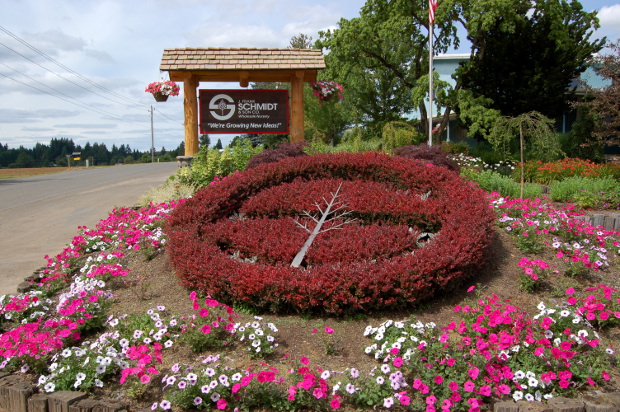 If you’re not familiar with J. Frank Schmidt, umm, it’s one of the largest and most respected wholesale nurseries in the country. They sell bareroot, B&B, and potted trees to garden centers and growers all across the U.S.
If you’re not familiar with J. Frank Schmidt, umm, it’s one of the largest and most respected wholesale nurseries in the country. They sell bareroot, B&B, and potted trees to garden centers and growers all across the U.S.
No doubt you’re familiar with Red Sunset® maple–probably the most popular tree cultivar of all time. It’s a JFS introduction, along with over 70 other selected and named trees that they have brought to market.
And if you don’t know Nancy Buley, well, that’s your loss. Nancy’s an icon in the nursery business and was just awarded in April of this year the prestigious Frederick Law Olmsted Award from the National Arbor Day Foundation for her efforts in encouraging the planting of trees.
She’s Kind of a Big Deal, but you’d never know it from talking to her. From our very first contact, she was so warm and welcoming to me that I felt like we were already old friends.
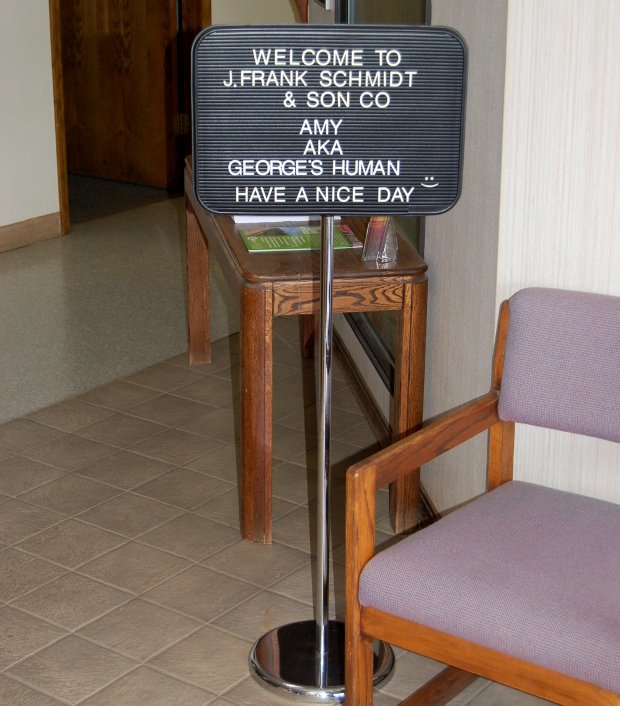 Here’s what greeted me in the lobby. The staff at JFS has been following the story of George the Comeback Cat, too!
Here’s what greeted me in the lobby. The staff at JFS has been following the story of George the Comeback Cat, too!
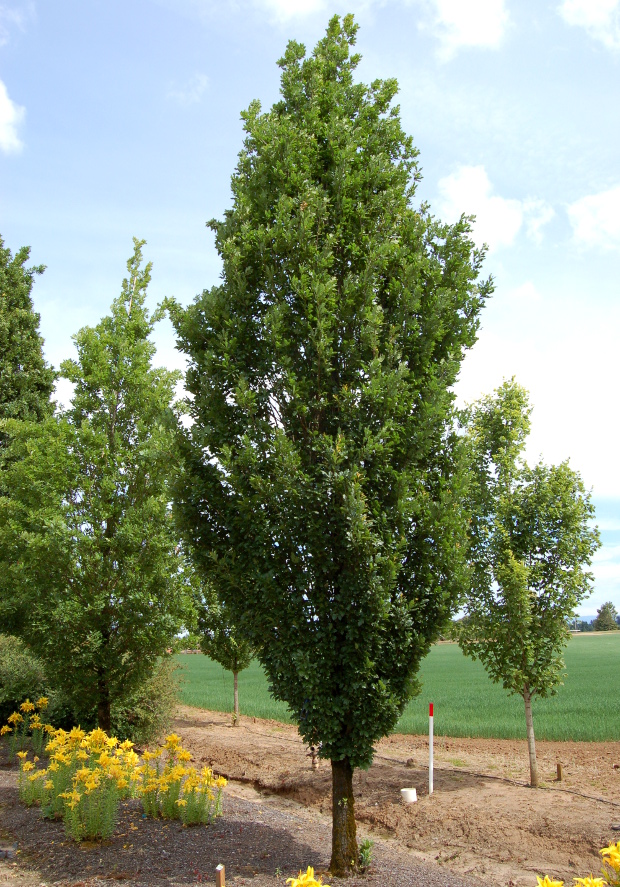 Several of JFS’s own introductions surround their main office in Boring, Oregon. Here a columnar oak of theirs, Skinny Genes® (isn’t that the best name?), stands tall.
Several of JFS’s own introductions surround their main office in Boring, Oregon. Here a columnar oak of theirs, Skinny Genes® (isn’t that the best name?), stands tall.
![]() There’s a lot of demand these days for tough, compact trees for cityscapes. Here’s one of JFS’s own answers to that: City Sprite® zelkova. It gets only 24 feet tall.
There’s a lot of demand these days for tough, compact trees for cityscapes. Here’s one of JFS’s own answers to that: City Sprite® zelkova. It gets only 24 feet tall.
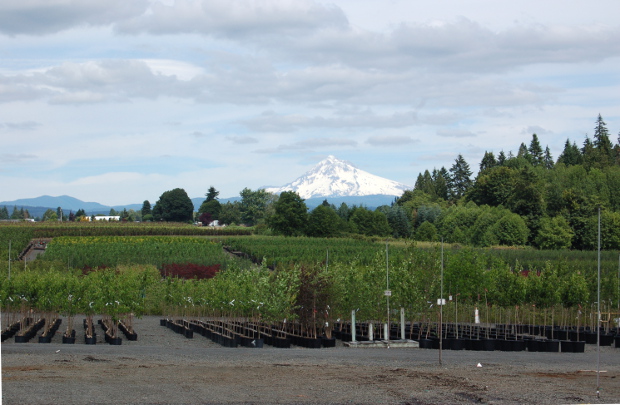 We hopped in Nancy’s truck and she took me through the container area, the propagation area, the new tree test plots, and endless fields of trees, all within view of lovely Mt. Hood in the distance. She said that JFS had 600 acres at that location alone.
We hopped in Nancy’s truck and she took me through the container area, the propagation area, the new tree test plots, and endless fields of trees, all within view of lovely Mt. Hood in the distance. She said that JFS had 600 acres at that location alone.
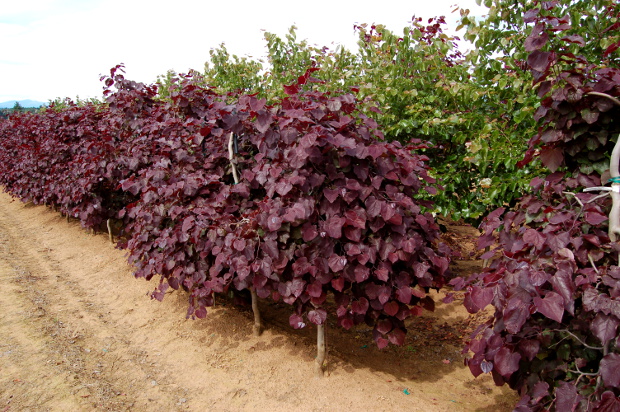 We stopped and drooled a while over these ‘Ruby Falls’ redbuds. This is what happens when a ‘Forest Pansy’ gets frisky with a Lavender Twist®. I noticed ‘Ruby Falls’ wasn’t in their catalog–probably because they can’t keep enough in stock. This plant is HOT.
We stopped and drooled a while over these ‘Ruby Falls’ redbuds. This is what happens when a ‘Forest Pansy’ gets frisky with a Lavender Twist®. I noticed ‘Ruby Falls’ wasn’t in their catalog–probably because they can’t keep enough in stock. This plant is HOT.
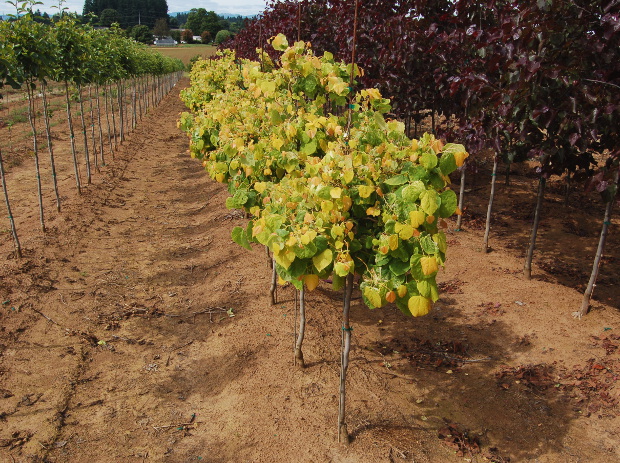 These outrageous yellow redbuds were drool-worthy, too. This is a selection called The Rising Sun™.
These outrageous yellow redbuds were drool-worthy, too. This is a selection called The Rising Sun™.
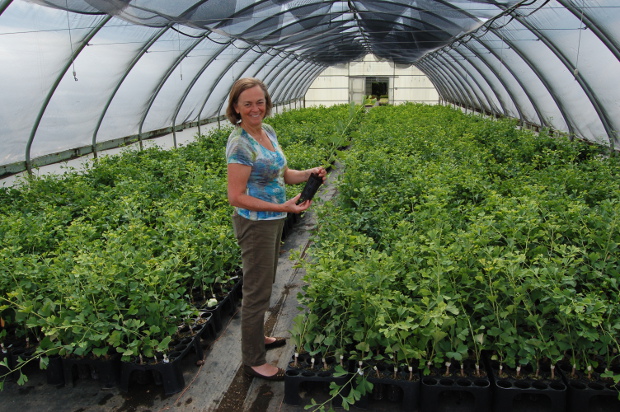 Here Nancy poses in a houseful of Golden Colonnade® ginkgos. The plant was discovered by Dr. Michael Dirr and introduced by J. Frank Schmidt.
Here Nancy poses in a houseful of Golden Colonnade® ginkgos. The plant was discovered by Dr. Michael Dirr and introduced by J. Frank Schmidt.
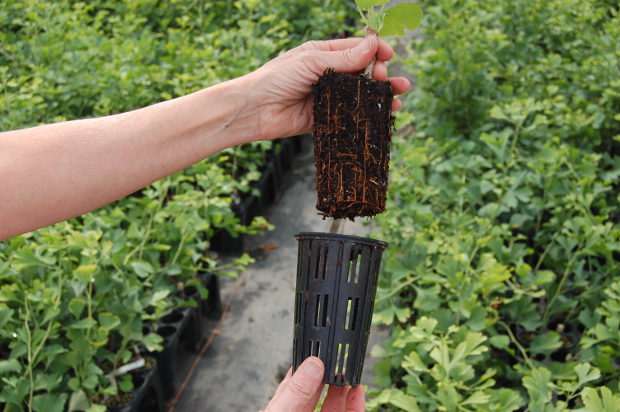 These are the RediRoot™ containers that J. Frank Schmidt designed for growing the ginkgos and many of their other tree liners. They keep the rootball from becoming a solid mass of circling roots. When the roots hit the air spaces, they stop; this is called “air pruning.” Ridges inside the container further discourage any sort of mischievous root-circling behavior.
These are the RediRoot™ containers that J. Frank Schmidt designed for growing the ginkgos and many of their other tree liners. They keep the rootball from becoming a solid mass of circling roots. When the roots hit the air spaces, they stop; this is called “air pruning.” Ridges inside the container further discourage any sort of mischievous root-circling behavior.
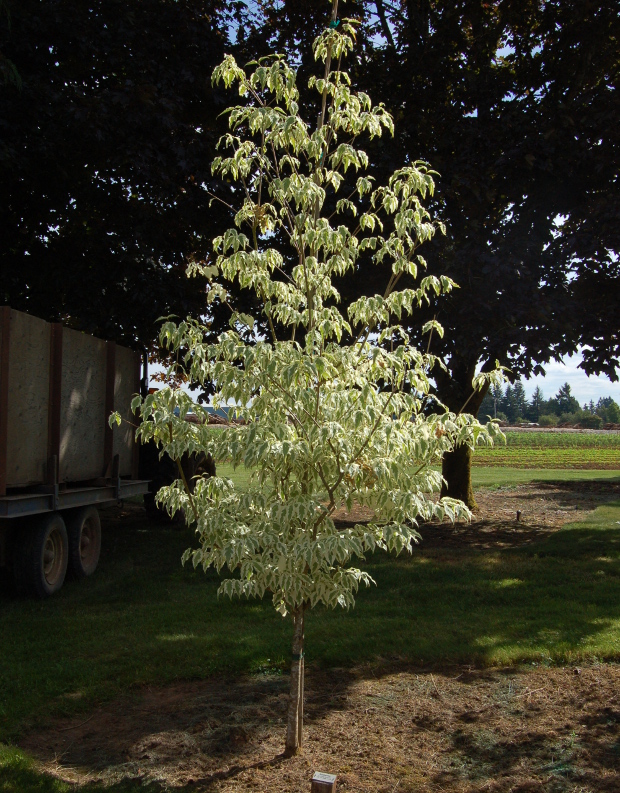 Nancy also took me through JFS’s 10-acre arboretum. Here I saw a ‘Summer Fun’ kousa dogwood, with variegation as bright as crisp white linens, freshly washed.
Nancy also took me through JFS’s 10-acre arboretum. Here I saw a ‘Summer Fun’ kousa dogwood, with variegation as bright as crisp white linens, freshly washed.
I also got to see Treephoria, just down the road from Nancy’s 9-to-5, which she owns with her son, Neil.
I hadn’t done my research, and I was expecting a little backyard specialty nursery with a collection of small container trees. I was so wrong. It was pretty extensive, all B&B, and there were some sizable specimens there. I did assume there would be some really cool stuff there, and I wasn’t wrong about that!
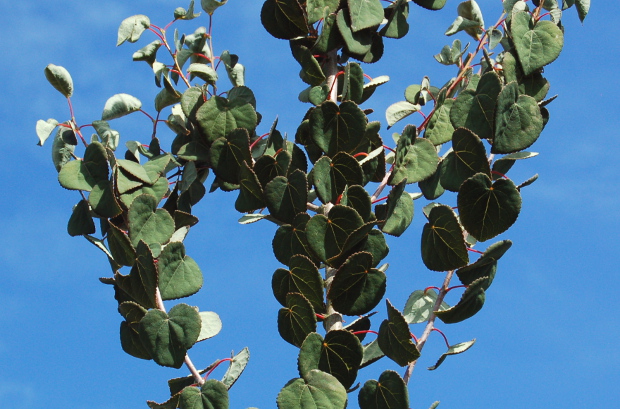 Red Fox (‘Rotfuchs’) katsura is not your average katsura (and even the plain-Jane straight species is pretty spectacular). The leaves emerge a deep, dusky wine-purple and fade to this unbelievably dark green. The foliage is thick and rubbery, like one of those grippers used to open too-tightly screwed-on lids.
Red Fox (‘Rotfuchs’) katsura is not your average katsura (and even the plain-Jane straight species is pretty spectacular). The leaves emerge a deep, dusky wine-purple and fade to this unbelievably dark green. The foliage is thick and rubbery, like one of those grippers used to open too-tightly screwed-on lids.
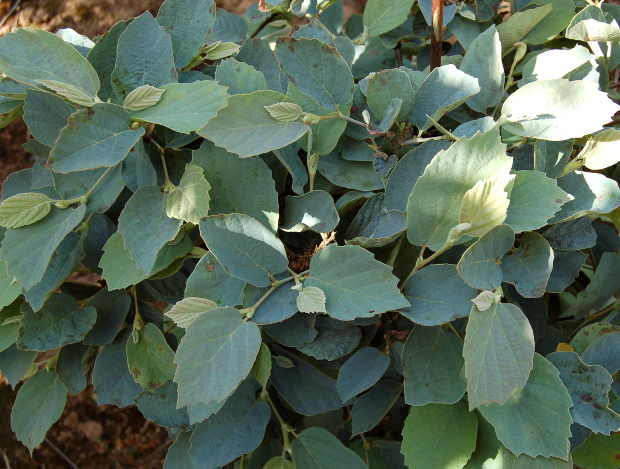 Nancy and Neil like to grow some plants not usually thought of as trees in a tree form. This ‘Blue Shadow’ fothergilla seemed to want to remain a shrub, but its glaucous blue foliage made my knees weak nonetheless. They also grow tree-form witchhazels, forsythia, and even beautyberry (Callicarpa)!
Nancy and Neil like to grow some plants not usually thought of as trees in a tree form. This ‘Blue Shadow’ fothergilla seemed to want to remain a shrub, but its glaucous blue foliage made my knees weak nonetheless. They also grow tree-form witchhazels, forsythia, and even beautyberry (Callicarpa)!
While Nancy was telling me about her tree-form shrubs, I noticed she was standing under a stewartia, and it looked as if she had plucked a flower and put it behind her ear. She agreeably mugged for the camera.
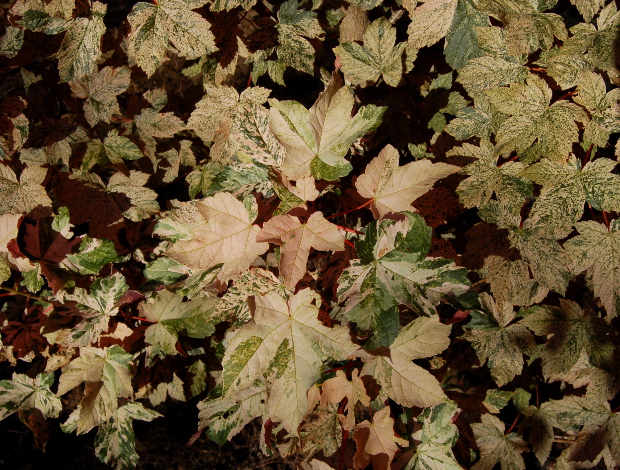 With a wry smile, she “casually” led me past some ‘Eskimo Sunset’ sycamore maples, letting me discover them on my own. I did, and blurted out something rude, like “SHUT. UP.”
With a wry smile, she “casually” led me past some ‘Eskimo Sunset’ sycamore maples, letting me discover them on my own. I did, and blurted out something rude, like “SHUT. UP.”
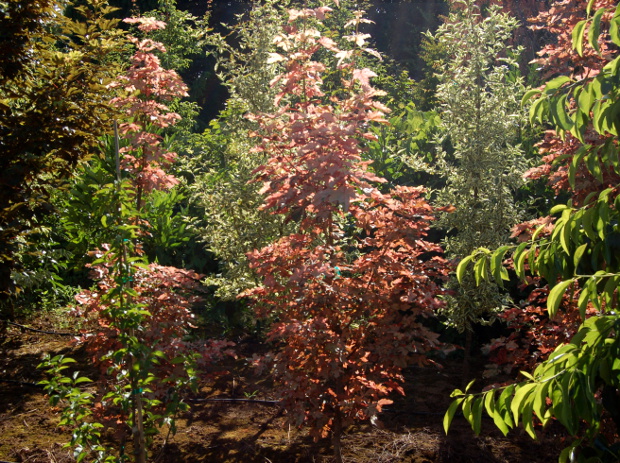 I had seen them before back in Northern Kentucky, but there, the Midwestern heat had sucked out a lot of the color. Here in Oregon they were PINK.
I had seen them before back in Northern Kentucky, but there, the Midwestern heat had sucked out a lot of the color. Here in Oregon they were PINK.
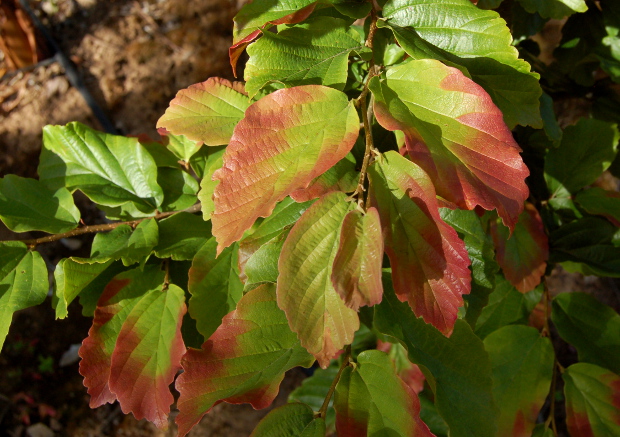 There was some mighty fine pink coloration going on with this parrotia, also. I think Nancy said this one was ‘Vanessa’, but I think Ruby Vase® does this, too.
There was some mighty fine pink coloration going on with this parrotia, also. I think Nancy said this one was ‘Vanessa’, but I think Ruby Vase® does this, too.
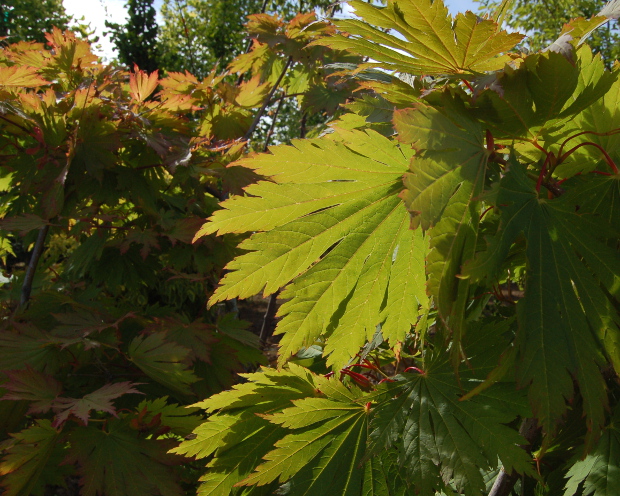 Nancy said she was fond of this ‘Ed Wood #2’ fullmoon maple, and I am, too. I know that greenleaf Japanese maples have superior fall color to most reds, and fullmoon (Acer japonicum) is no exception. ‘Ed Wood’ has especially large, tropical-looking leaves to boot.
Nancy said she was fond of this ‘Ed Wood #2’ fullmoon maple, and I am, too. I know that greenleaf Japanese maples have superior fall color to most reds, and fullmoon (Acer japonicum) is no exception. ‘Ed Wood’ has especially large, tropical-looking leaves to boot.
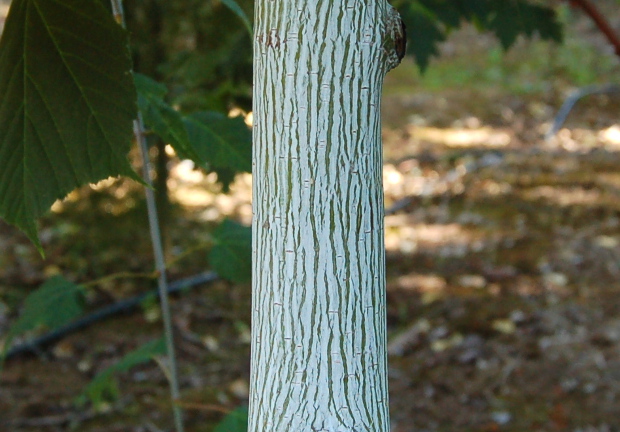 At the end of my amazing whirlwind tour of J. Frank Schmidt and Treephoria, we happened upon a ‘Joe Witt’ snakebark maple (Acer tegmentosum). That chalky-white bark is like nothing else. What a beautiful finish to a tour of two remarkable nurseries. Thank you, Nancy!
At the end of my amazing whirlwind tour of J. Frank Schmidt and Treephoria, we happened upon a ‘Joe Witt’ snakebark maple (Acer tegmentosum). That chalky-white bark is like nothing else. What a beautiful finish to a tour of two remarkable nurseries. Thank you, Nancy!

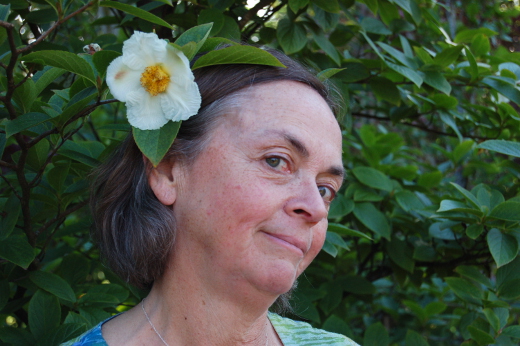
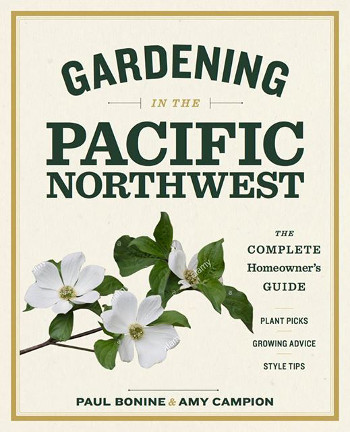
Ah you bring back fabulous memories of a stormy fall day when team plantlust visited Treephoria and then snacked on soup and wine in front of the fire, perfect.
Loree, I did read your account at http://dangergarden.blogspot.com/2011/02/visit-to-treephoria.html yesterday. I’ll have to go back when the witchhazels are blooming, so I can see those, too. I hope you have rectified your grave error of not having any witchhazels in your own garden! I’d hate for you to lose your Gardener Card.
[…] Trees Are the Answer at J. Frank Schmidt and Treephoria […]